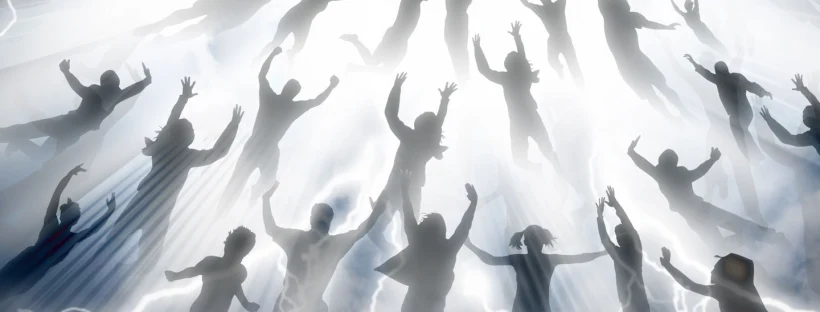Isaiah 26:19-21: Thy dead men shall live, together with my dead body shall they arise. Awake and sing, ye that dwell in dust: for thy dew is as the dew of herbs, and the earth shall cast out the dead. (20) Come, my people, enter thou into thy chambers, and shut thy doors about thee: hide thyself as it were for a little moment, until the indignation be overpast. (21) For, behold, the LORD cometh out of his place to punish the inhabitants of the earth for their iniquity: the earth also shall disclose her blood, and shall no more cover her slain.
As I read the verses above, the first thing that shot into my mind was how this passage seems to fit perfectly with other verses in the bible that talk about an upcoming and imminent event that we Christians commonly refer to as the “Rapture.” Many Bible commentaries do not interpret Isaiah 26:19-21 this way, with some instead applying it to God’s last plague before the Jewish exodus. In fact, you don’t see many rapture-believing Christians refer to this verse as a proof text. So I decided to provide reasons why this passage clearly refers to the Rapture. Incidentally, commentaries by Dr. Henry H. Morris and David Guzik are among such that include this verse as a proof text for the Rapture.
Let’s examine this passage carefully:
Reason 1: “Thy dead men shall live, together with my dead body shall they arise.”
Concerning the above, Dr. Henry Morris of the Defender’s Study Bible states:
Here is an Old Testament assurance of bodily resurrection of the believing dead, such assurance being possible because God Himself, in Christ, would conquer death. Believers would arise “together with my dead body.” This was literally fulfilled at the time of Christ’s resurrection (Matthew 27:52-53). It will be completed when Christ returns and “all that are in the graves … shall come forth” (John 5:28-29).
In the progression of events which comprise the Rapture, the first thing that occurs is the bodily resurrection of the saints (called “the dead in Christ” in 1 Thessalonians 4:15-16 and “they that are Christ’s” in 1 Corinthians 15:23). This is the first piece of evidence which clues us in to the fact that this verse is indeed a proof text for the Rapture. Since this is also a Messianic prophecy (“my dead body shall …arise”), I would like to point out to my unbelieving Jewish friends that this verse seems to refute the common (albeit erroneous) rabbinic interpretation of Isaiah 53’s suffering servant as the nation of Israel instead of Yeshua the Messiah Who according to this verse, is God. Because God is speaking in Isaiah 26:19, we know that it is God Who’s dead body arises accompanied afterward by all that are in the grave.
Reason 2: “Come, my people, enter thou into thy chambers, and shut thy doors about thee”
In John 14:2-3 we read:
“In my Father’s house are many mansions: if it were not so, I would have told you. I go to prepare a place for you. And if I go and prepare a place for you, I will come again, and receive you unto myself; that where I am, there ye may be also.”
What is and where are these chambers which allow us to “hide” from the coming indignation? Could the place that Christ is preparing for His believers (where there are many mansions) contain the chambers we are to abide in until the end of the Great Tribulation? This seems to make good sense. After all, in the very next verse we are told that Christ’s purpose for preparing this place for us is so that He can come again to receive us unto Himself which is precisely what the Rapture is all about.
So, the second reason why this passage refers to the Rapture is because the “chambers” in Isaiah 26:20 seem to coincide with the heavenly “place” which Christ prepares for those Christians that He comes back to get.
Reason 3: “the indignation be overpast.”
Concerning the above, Dr. Henry Morris states in his commentary:
“The indignation” is the great tribulation, during the height of which the believing Israelites will be preserved supernaturally by God in the wilderness (Revelation 12:13-16). In a secondary application, this promise will also apply to all the saints caught up to be with Christ prior to the onset of the tribulation period (1 Thessalonians 4:17; 1 Thessalonians 5:3).
The central purpose of the Rapture is to exclude Christ’s people from the wrath to come (see Have we forgotten about the Rapture). Consequently, it follows that Isaiah 26:21 is a perfect supporting text for the Rapture since it’s main point is that God wants His people spared from the wrath that is to come.
Reason 4: “the LORD cometh out of his place to punish the inhabitants of the earth.”
Since the Great Tribulation’s purpose is to punish “the earth’s inhabitants” for their iniquity in rejecting God and His Christ (Psalms 2:2-5), it is not hard to understand why Isaiah 26:21 parallels other verses which describe the intent of the tribulation period (Revelation 3:10, 1 Thessalonians 1:10). Therefore, the fourth reason why this passage refers to the Rapture is because the punishment that comes is brought by God (i.e. “the Lord cometh out of His place to punish”) and the punishment is meant for all people (i.e. the inhabitants of the earth) who have not obeyed the Gospel.
Finally, David Guzik’s Commentary on Isaiah 26:19-21 states:
When is this time when God’s people are carried away, securely hidden, from a time of great indignation the Lord brings upon the earth? It can refer to the deliverance of the Jewish people from the fury of the Antichrist described in Rev 12:6 and 12:13-16. But it is more likely that it speaks of the refuge, the safety, the security of God’s people when they are caught up together with the Lord in the air (1Th 4:16-17) and escape the horrific indignation of the Lord that He pours out upon the world in the Great Tribulation (Mat 24:21-22, Rev_9:15-21), which will immediately precede the second coming of Jesus Christ (Mat 24:29-30). Seen this way, this is a powerful passage supporting the teaching of the Pre-Tribulation Rapture, which says that Jesus Christ will remove His people from this earth before the time of Great Tribulation coming upon the earth immediately before His ultimate return.

